The PSAARC declaration
The People's SAARC (PSAARC) declaration,which called for the governments to address a number of issues from food security to climate justice, established the network as advocates for a progressive humanitarian agenda

The People's SAARC (PSAARC) declaration,which called for the governments to address a number of issues from food security to climate justice, established the network as advocates for a progressive humanitarian agenda
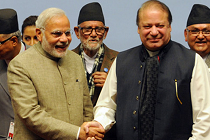 Courtesy: MEA/Government of India
Courtesy: MEA/Government of India
The recent SAARC Summit was once again derailed by India-Pakistan dissonances. Is it time for India to look beyond this collective? Or are there ways to overcome the distrust and address border issues, build institutions to implement common goals, and create an economic union of confident democracies?
The 18th SAARC Summit held in Nepal concluded on November 27 with the release of the Kathmandu Declaration. Did the summit live up to its expectations? Was concrete progress made, and if so in which areas? Where is SAARC heading now? Gateway House asks and answers five questions on the outcome of the summit
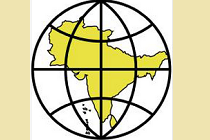 Courtesy: PSAARC
Courtesy: PSAARC
Parallel to the official SAARC meeting was the People's SAARC in Kathmandu. Comprising NGOs, civil society leaders, and activists, the PSAARC is a platform that rejects narrow nationalism and religion in favour of a transcendent South Asian identity
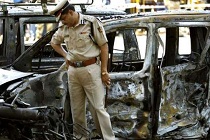 Courtesy: wikimedia
Courtesy: wikimedia
Despite an early regional consensus on counter-terror, SAARC’s record in tackling terrorism remains dismal. With the widening network of terrorist groups in the subcontinent, it is imperative that India takes the lead in forging substantial counter-terrorism cooperation, particularly on the issue of financing
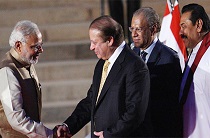 Courtesy: pmindia.nic.in
Courtesy: pmindia.nic.in
The 18th SAARC Summit in Kathmandu next week is an opportunity for member countries to start shaking off the shackles of distrust. Instead, SAARC must robustly move forward on such issues as regional connectivity, SAFTA, climate change, and security—and India can be the prime mover in building this renewed cooperation
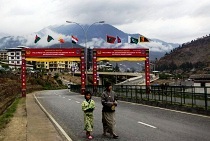 Courtesy: Wikimedia commons
Courtesy: Wikimedia commons
The 18th SAARC Summit will cover a wide range of issues, including connectivity, climate change, and SAFTA. A number of similar issues were discussed at the last summit—what’s been the progress since then? Given its constraints, does the association have a future? Gateway House asks and answers five questions on SAARC
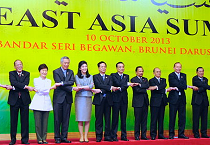 Courtesy: wikimedia
Courtesy: wikimedia
After bilateral meetings, the thrust for Prime Minister Modi will now change with various multilateral summits coming up, starting with India-ASEAN and the East Asia Summit next week. These are opportunities to expand India’s regional position and economic links, and address issues such as terrorism and a rising China
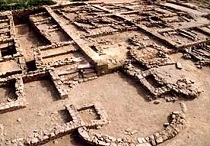 Courtesy: wikimediacommons
Courtesy: wikimediacommons
After a brief a spell of bonhomie marked by Pakistani Prime Minister Nawaz Sharif attending Narendra Modi’s swearing-in ceremony, the hostilities between the two countries have resumed. Amidst the backdrop of increased tensions on the LoC, Gateway House recommends some small, realistic steps forward through state-to-state diplomacy, to mend the bilateral
 Courtesy: Wikimedia Commons
Courtesy: Wikimedia Commons
The UN and the global finance industry are making gradual but concerted efforts to align business interests and ecological sustainability. A growing number of companies are combining profit-making with social responsibility. There is still a long way to go, but the UN system has created useful mechanisms of change